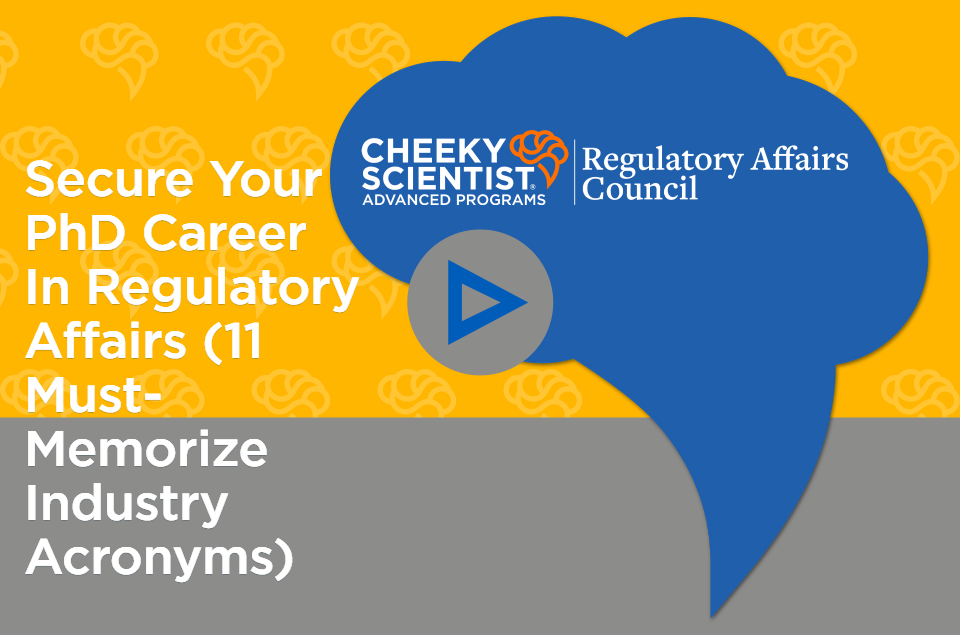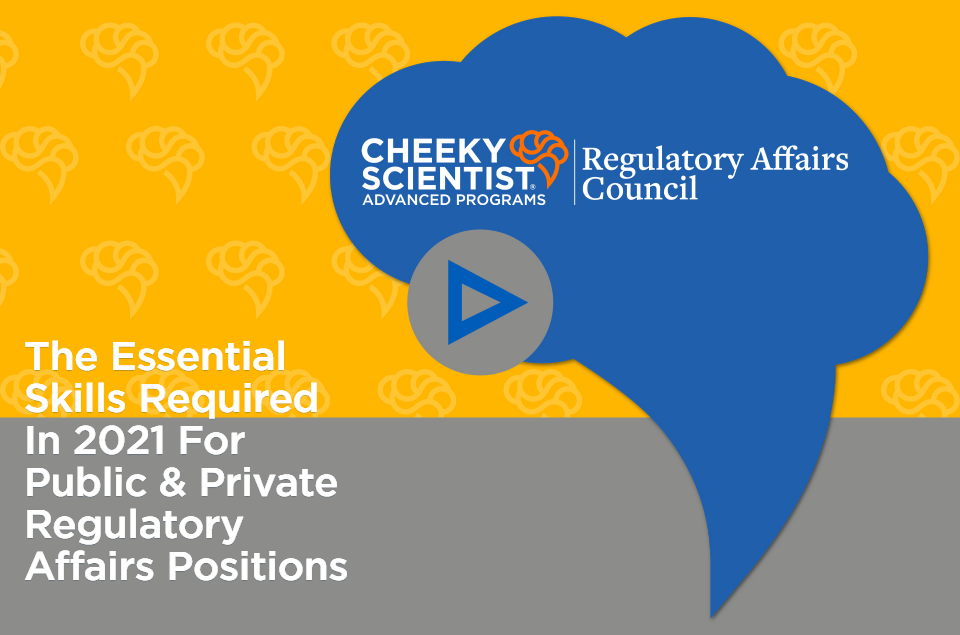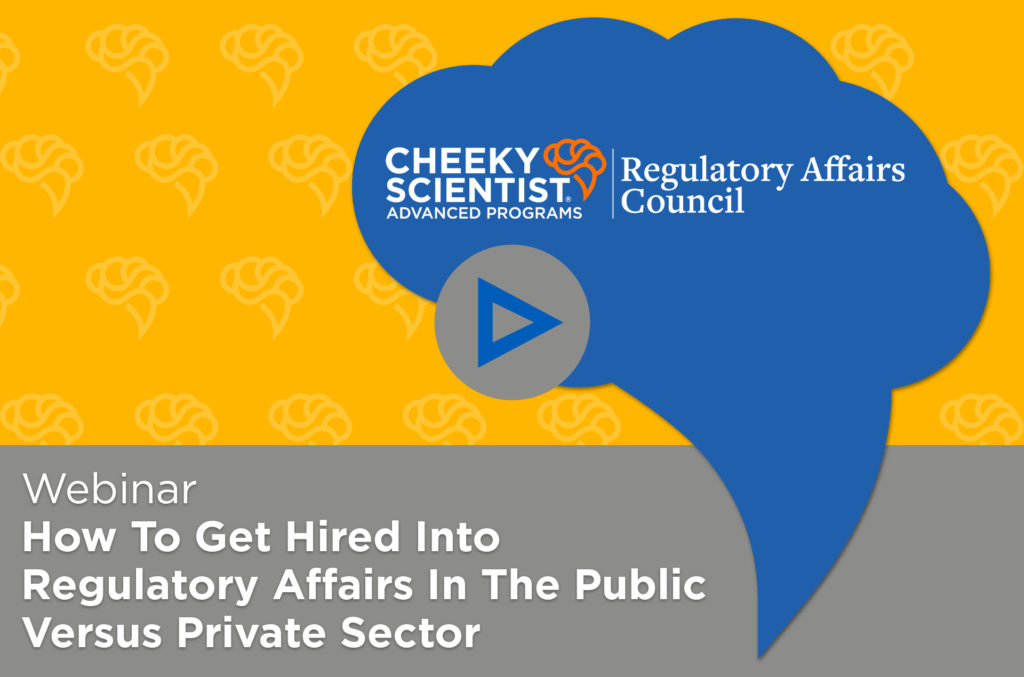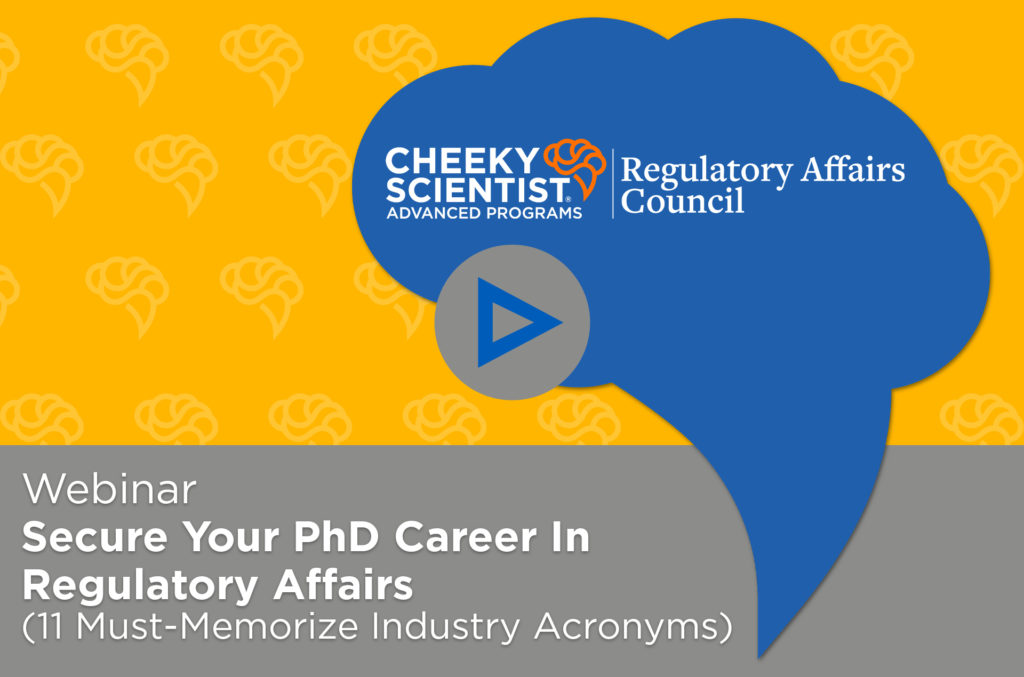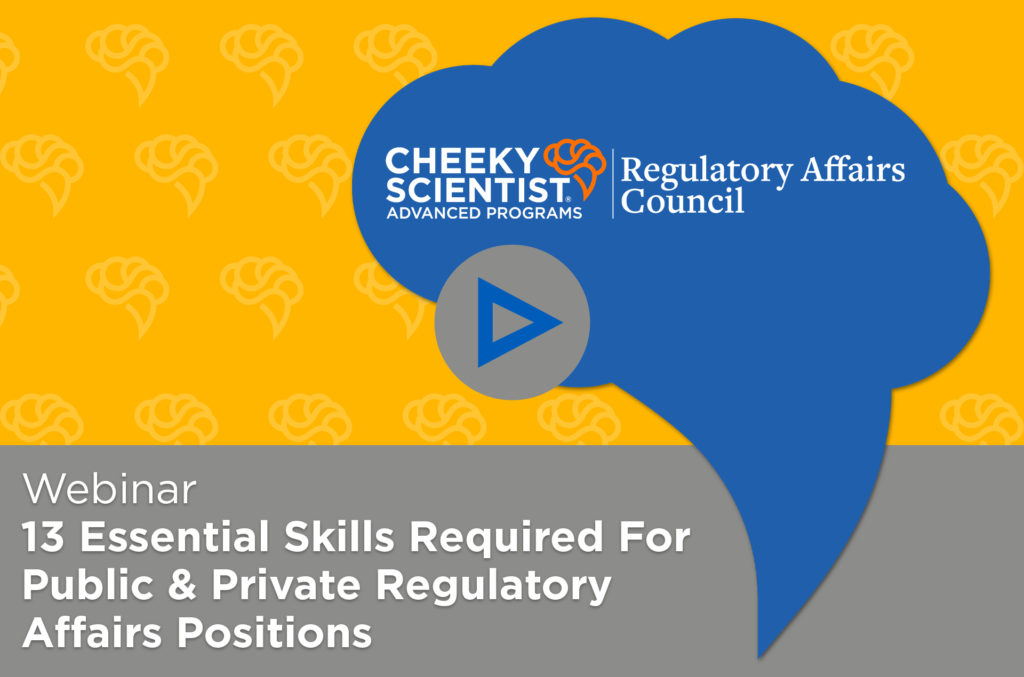Regulatory Affairs Council Webinars
Secure Your PhD Career In Regulatory Affairs (11 Must-Memorize Industry Acronyms)
$19.99Regulatory affairs job listings have increased to over 7,000 (LinkedIn), and the pandemic-driven demand for new medical products and technologies further raises the need for these professionals. PhDs are being hired into Regulatory Affairs positions at an accelerated rate. Why? Because PhDs like you have technical expertise, technical literacy, and regulatory awareness skills ...even though you may not realize it. Unfortunately, PhDs wanting to transition to regulatory affairs have to overcome a significant challenge: the nomenclature barrier. Regulatory affairs professionals speak their own language loaded with acronyms – like NDA, IND, and DMF – you never hear in academia. Emerging trends in the regulatory affairs point to changes in hiring within the field and an expansion of positions that are available. This results in a demand for new skills for those looking to enter the field. To help you get started in regulatory affairs, we’ve put together a new webinar titled “Secure Your PhD Career In Regulatory Affairs (11 Must-Memorize Industry Acronyms),” we’ll share the keys to this industry’s hiring process that we’ve learned from associates currently working as regulatory affairs specialists.
The Essential Skills Required In 2021 For Public & Private Regulatory Affairs Positions
$19.99Regulatory affairs job listings have increased to over 7,000 (LinkedIn), and the pandemic-driven demand for new medical products and technologies further raises the need for these professionals. PhDs are being hired into Regulatory Affairs positions at an accelerated rate. Why? Because PhDs like you have technical expertise, technical literacy, and regulatory awareness skills ...even though you may not realize it. Unfortunately, PhDs wanting to transition to regulatory affairs have to overcome a significant challenge: the nomenclature barrier. Regulatory affairs professionals speak their own language loaded with acronyms – like NDA, IND, and DMF – you never hear in academia. Emerging trends in the regulatory affairs point to changes in hiring within the field and an expansion of positions that are available. This results in a demand for new skills for those looking to enter the field. To help you get started in regulatory affairs, we’ve put together a new webinar titled “The Essential Skills Required In 2021 For Public & Private Regulatory Affairs Positions,” we’ll share the keys to this industry’s hiring process that we’ve learned from associates currently working as regulatory affairs specialists.
How To Get Hired Into Regulatory Affairs As A PhD (13 Must Memorize Acronyms)
$19.99⅓ of all companies in the private sector are aggressively expanding their regulatory affairs department this year (RAPS). In the public sector, new positions are being created at a surprisingly high rate. Here’s the thing about regulations - they always expand. Government agencies are imposing more regulations on medical and other products, and new regulatory affairs professionals are needed to navigate them. But there’s one crucial catch. The hiring process for regulatory affairs associates is drastically different depending on whether the position is in a private company or in government. You need to master these differences between the public and private sectors, and demonstrate the skills required for a role in regulatory affairs if you want to get hired. Join us for a webinar titled “How To Get Hired Into Regulatory Affairs As A PhD (13 Must Memorize Acronyms)” to find out professional insight into this career path. We’ll show you exactly what to expect from your regulatory affairs job search so you don’t lose out on a job offer due to being blindsided by key aspects of the process.
Secure Your PhD Career In Regulatory Affairs (11 Must-Memorize Industry Acronyms)
$19.99Over 70 countries have altered the regulations governing medical products because of the pandemic (PwC). Why should you care? Because it creates new regulatory affairs positions – positions PhDs are being hired into at an accelerated rate – across the entire globe. Further, these positions are secure because regulations ALWAYS expand. But there’s one crucial catch: the nomenclature barrier. Regulatory affairs professionals speak their own language loaded with acronyms – like NDA, IND, and DMF – you never hear in academia. Many of these acronyms are the same across different countries. You must become an expert in this language and in keeping up with different regulations created by different agencies to secure a role in regulatory affairs. To help you get started in your regulatory affairs job search, we’ve put together a new webinar titled “Secure Your PhD Career In Regulatory Affairs (11 Must-Memorize Industry Acronyms),” we’ll share the keys to this industry’s hiring process that we’ve learned from associates currently working as regulatory affairs specialists.
How To Get Hired Into Regulatory Affairs In The Public Versus Private Sector
$19.99Over 70 countries have altered the regulations governing medical products because of the pandemic (PwC). As a result, new regulatory affairs positions are being created at a surprisingly high rate across both the public and private sectors. Further, these positions are secure because regulations ALWAYS expand. As a PhD, you are well-qualified for these positions. But there’s one crucial catch. The hiring process for regulatory affairs associates is drastically different depending on whether the position is in a private company or in government. You need to use different resume formats for positions in both sectors. Instead, you must master the differences between the public and private sectors on top of demonstrating the skills required for a role in regulatory affairs if you want to secure one of these in-demand jobs. Join us for a webinar titled “How To Get Hired Into Regulatory Affairs In The Public Versus Private Sector.” During this webinar, you’ll get insider information on this career path. We’ll also show you exactly what to expect from your regulatory affairs job search regardless of whether you wish to work in the public or private sector.
Secure Your PhD Career In Regulatory Affairs (11 Must-Memorize Industry Acronyms)
$19.99Regulatory affairs job listings have increased by 42% in recent years (Massachusetts Biotechnology Education Foundation), and the pandemic-driven demand for new medical products and technologies further raises the need for these professionals. Here’s the good news - PhDs are being hired into Regulatory Affairs positions at an accelerated rate. Why? Because PhDs like you have technical expertise, technical literacy, and regulatory awareness skills ...even though you may not realize it. Unfortunately, PhDs wanting to transition to regulatory affairs have to overcome a significant challenge: the nomenclature barrier. Regulatory affairs professionals speak their own language loaded with acronyms – like NDA, IND, and DMF – you never hear in academia. Many of these acronyms are the same across different countries. You must become an expert in this language and in keeping up with different regulatory agencies to secure a role in this sector. To help you get started in your regulatory affairs job search, we’ve put together a new webinar on Monday August 10th at 1pm ET (5pm UTC +0, or 1am UTC +8). During this webinar titled “Secure Your PhD Career In Regulatory Affairs (11 Must-Memorize Industry Acronyms),” we’ll share the keys to this industry’s hiring process that we’ve learned from associates currently working as regulatory affairs specialists.
13 Essential Skills Required For Public & Private Regulatory Affairs Positions
$19.99⅓ of all companies in the private sector are aggressively expanding their regulatory affairs department this year (RAPS). In the public sector, new positions are being created at a surprisingly high rate. Here’s the thing about regulations - they always expand. Government agencies are imposing more regulations on medical and other products, and new regulatory affairs professionals are needed to navigate them. But there’s one crucial catch. The hiring process for regulatory affairs associates is drastically different depending on whether the position is in a private company or in government. You need to master these differences between the public and private sectors, and demonstrate the skills required for a role in regulatory affairs if you want to get hired. Join us on Monday August 17th at 1pm ET (5pm UTC +0, or 1am UTC +8) for a webinar titled “13 Essential Skills Required For Public & Private Regulatory Affairs Positions” to find out professional insight into this career path. We’ll show you exactly what to expect from your regulatory affairs job search so you don’t lose out on a job offer due to being blindsided by key aspects of the process.

